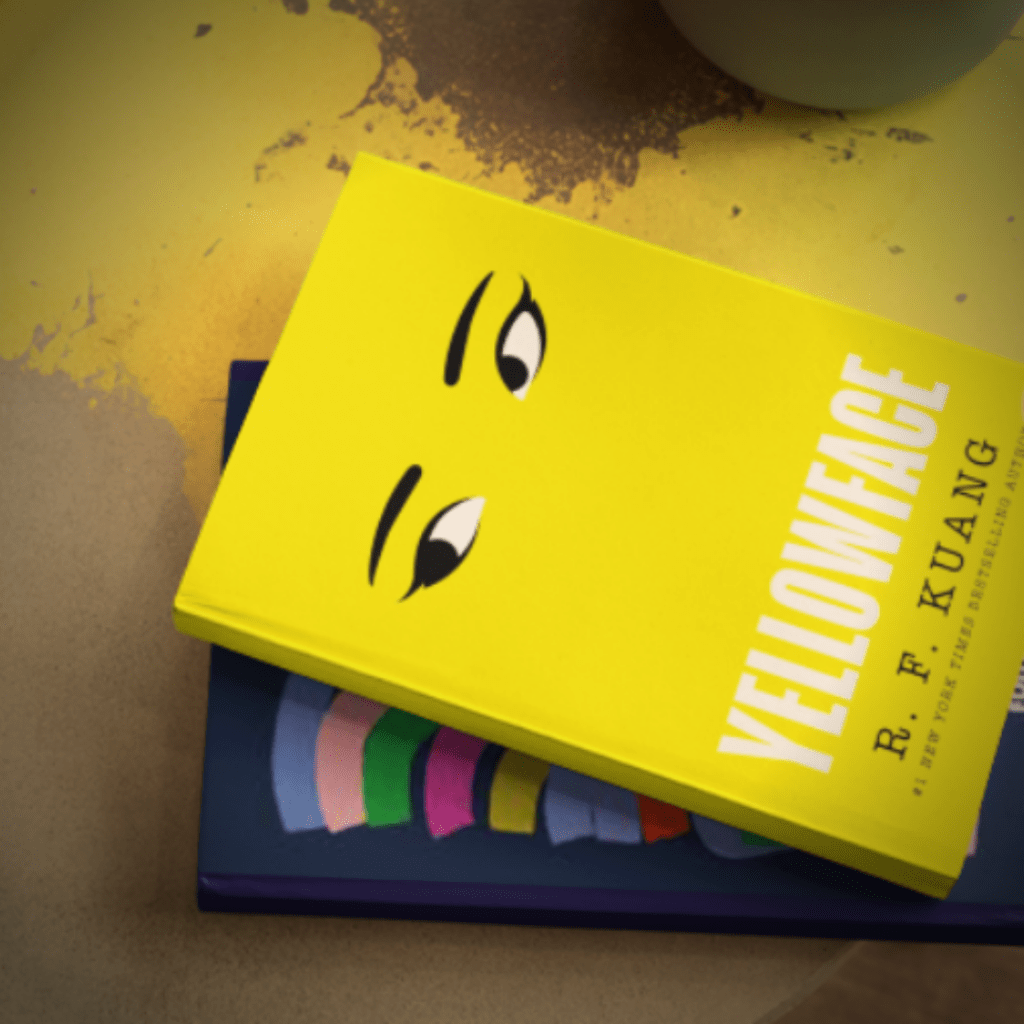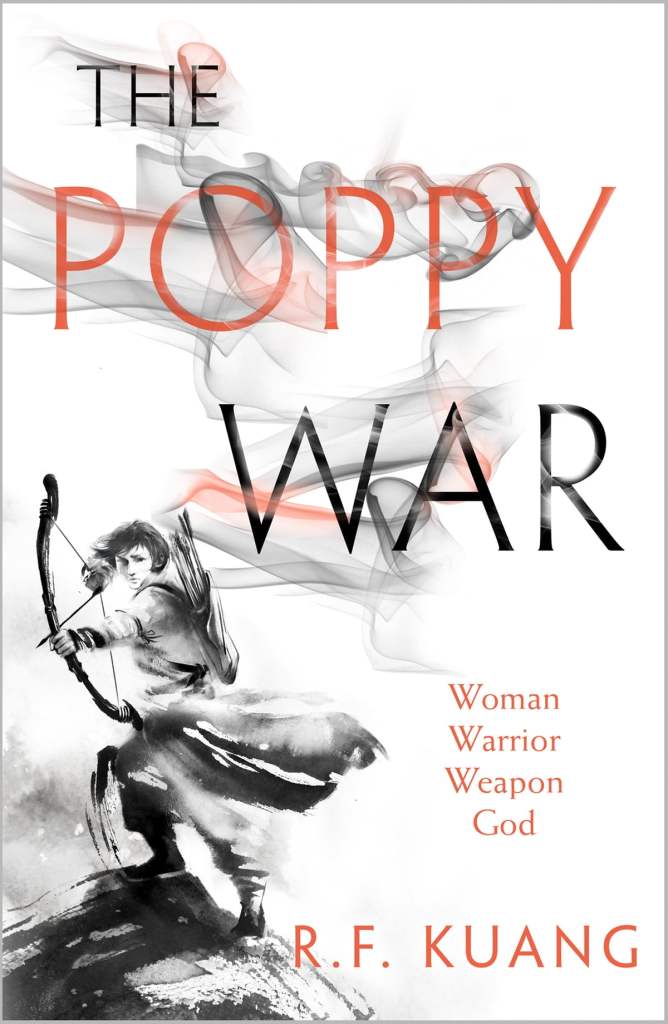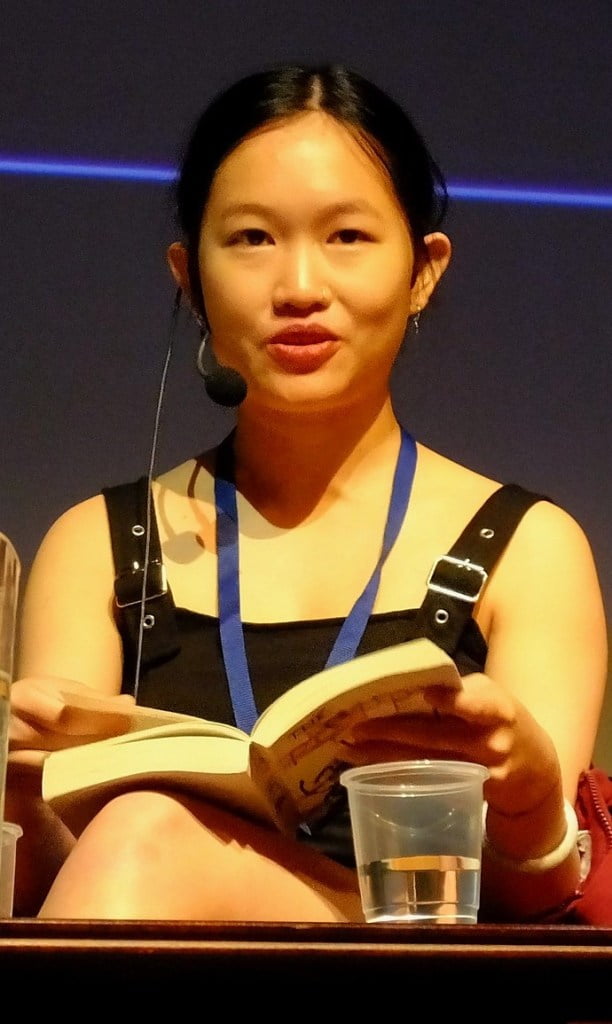
In a world where the tender fibres of our personal stories are often plucked for personal gain, the sting of betrayal is an ever-present spectre. This palpable sentiment resonates profoundly in R.F. Kuang’s latest book, “Yellowface.” With surgical precision, the novel excavates the underbelly of the publishing industry, unearthing the disquieting truth that our narratives, in one guise or another, are commodities ripe for extraction.
While “Yellowface” falls under the literary fiction book genre, Kuang thrusts us into a compelling introspection with this meta novel. She peels back the layers of an industry where the boundaries between paying tribute to someone and outright stealing happen to blur, thus challenging our understanding of creative ethics and integrity.
Warning: spoilers ahead and includes content around sexual assault and racism.
Who is R.F. Kuang?
MEET THE AUTHOR
R. F. Kuang
R.F. Kuang is an American fantasy and contemporary fiction writer. She is the author of the Poppy War trilogy, Babel, and Yellowface.
Kuang was born in Guangzhou, China, and raised in Boston, Massachusetts. She graduated from Yale University with a degree in East Asian Languages and Literatures. After graduating, she worked as a management consultant before becoming a full-time writer.


Her debut novel, The Poppy War, was published in 2018. The novel is set in an alternate history version of China and tells the story of Rin Chuan, a young woman who joins the military to avenge her family’s death. The Poppy War was a critical and commercial success, and it won the Compton Crook Award, the Crawford Award, and the 2020 Astounding Award for Best New Writer. Kuang’s second novel, The Dragon Republic, was published in 2019. The novel is the sequel to The Poppy War and continues the story of Rin Chuan. The Dragon Republic was also a critical and commercial success, and it was a finalist for the Nebula Award for Best Novel.
The third novel in the Poppy War trilogy, The Burning God, was published in 2020 and concludes the story of Rin. Babel: An Arcane History, was published in 2022. The work is a stand-alone fantasy novel that tells the story of a group of translators who are tasked with translating a dangerous and forbidden text. Babel won the Nebula Award for Best Novel in 2022. Yellowface is her most recent book. In addition to her novels, Kuang has also written several short stories and essays. She is a regular contributor to the Tor.com blog, and she has spoken at several literary festivals and conferences.
Definition of Yellowface
The title of the book “Yellowface” refers to the practice of white actors playing Asian characters in theatre, film, and television. This practice is considered to be racist and offensive, as it perpetuates stereotypes about Asian people.
What is the book Yellowface about?
Kuang’s book, “Yellowface,” ingeniously peels back the layers of the publishing world, unravelling a thought-provoking satire that delves deep into the shadows cast by racism, cultural appropriation, and the stifling of Asian-American narratives. The narrative orbits around the ethically labyrinthine journey of June Hayward, a white protagonist / antagonist who seizes the unpublished opus of the late Chinese American author Athena Liu, following Athena’s tragic demise. What ensues is a tangled network of deception, where June pirouettes into an unforeseen realm of success.
However, Kuang deftly employs the element of invisibility to etch a sense of disquietude into the writer’s newfound glory. Anonymous messages, like spectral whispers, threaten to unfurl the truth behind her façade, compelling June, who writes under the name Juniper Song, to grapple with a disconcerting truth. The narrative crescendos as June races against time, her fervent efforts kindling a confrontation not merely with her duplicity, but with the phantoms of racism and complicity that subtly permeate her psyche.
The artistry of “Yellowface” lies not only in its thematic explorations but in its storytelling design. The tale unfurls through June’s eyes, her perspective veering unpredictably into the realm of the unreliable. Through this lens, Kuang skilfully dissects the anatomy of white privilege and the gnawing vestiges of internalised racism, culminating in a chorus of deception and exploitation.
Read: Truth is stranger than autofiction: examples like Bret Easton Ellis
The novel casts an unflinching spotlight upon the publishing sphere’s dearth of diversity, its proclivity for elevating pale visages over those enriched with diverse backgrounds. A subtle critique unfurls as the narrative contemplates the legacy of Athena Liu, an unvoiced writer emblematic of countless silenced Asian-American voices in the literary sphere.
Kuang’s oeuvre ingeniously amalgamates the past and present, as the novel is anchored in contemporary times, yet fluidly traverses the annals of Chinese immigration to the United States. This historical backdrop serves as a stark reminder, illustrating the enduring racial bias that has surreptitiously pervaded American society. In this vein, Kuang adroitly unveils the unsettling resonance of racism and cultural appropriation, urging readers to contemplate the implications inscribed in our shared consciousness.
“Yellowface” emerges as an incisive, timely literary intervention, one that beckons readers to navigate the tendrils of racism and cultural appropriation that still writhe beneath the surface. With masterful strokes, Kuang beckons her audience to ponder the subtle yet pernicious strands of prejudice that continue to thrive, even as society evolves.
The theft of traumatic stories
Within the elaborate plot of R.F. Kuang’s “Yellowface,” the act of appropriating tales of trauma emerges as a central motif, stirring profound ethical questions. “Writing is an act of thievery,” admits Khalid Hosseini, author of the autobiographical novel The Kite Runner. While fictionalising a person’s intimate experiences would not usually be considered plagiarism, it’s a close second. It’s a form of hijacking trauma in some cases.
At the heart of this narrative, protagonist June Hayward endeavours to rationalise her own literary larceny by drawing upon an illustrative anecdote, a testament to the complexity of her moral justification:
“She (Athena Liu) probably didn’t even think of it as theft. The way she described it, this process wasn’t exploitative, but something mythical and profound. “I try to make sense of the chaos,” she told the New Yorker once.”
‘Juniper song’, Yellowface
In this paradox, the novel thrusts readers into a quagmire of perspectives, inviting them to navigate the shades of grey that envelop creative appropriation.
However, for ‘Juniper,’ Athena had already robbed her of her own trauma and thus, in some instances, it can be considered a tale of retaliation. When she revealed that Athena had regurgitated her experience of being sexually assaulted into a short fiction story for a magazine without her consent, she felt it was stealing and hence she didn’t feel as bad about “getting my revenge.”
“[They] weren’t quite my words. Just my feelings, all of my confused and tangled thoughts, articulated in a clean, understated yet sophisticated style that I didn’t then have the eloquence to achieve.”
‘Juniper song’, Yellowface
It can therefore be said that the justifications of mining experiences are as complex as the stories themselves.
The erasure of voices
“The truth is fluid. There is always another way to spin the story, another wrench to throw into the narrative,” contends the central figure, June, who is entangled in a web of literary subterfuge. Her mask is unveiled by the unyielding scrutiny of a former disgruntled employee, unravelling a plethora of accusations and justifications, a dance where voices clash and tales intertwine.
“The truth is fluid. There is always another way to spin the story, another wrench to throw into the narrative. I have learned this now, if nothing else. Candice may have won this round, but I won’t let her erase my voice. I will tell our audience what they ought to believe. I will undermine all of her assertions, ascribe new motivations, and alter the sequence of events.”
‘Juniper song’, Yellowface
In this maze of allegations and counter-assertions, June’s intention is clear – a strategic recasting of the narrative architecture, an attempt to align herself with an unspoken desire for exoneration. “I will undermine all of her assertions, ascribe new motivations, and alter the sequence of events,” she proclaims, each word a calculated step towards reshaping the discourse.
Read: The Wager by David Grann on ‘the mutiny that never was’ – review
The vehemence of June’s response also speaks to the tumultuous landscape of our times. “This is cancel culture gone deadly,” she contends, invoking a term laden with contemporary connotations, sparking a dialogue about the consequences of public judgment and repercussion. With an accusatory finger pointed, June invites scrutiny upon her critics, projecting her own ordeal as emblematic of a societal malaise.
In this interplay of voices Kuang captures the essence of the book, showcasing defiance, manipulation, and the struggle to retain agency amid the cacophony of competing perspectives.
But the author does not just refer to dialogue between the living. When June is confronted with the very real situation that Athena’s original notebooks would be published with the potential to expose her scam, she convinced Athena’s mother Mrs. Liu to retain the collection and never open them. She feeds a cock-and-bull story to save herself by saying: “I don’t know, I feel like donating them to an archive would be a violation. Like putting her corpse on display.” In this way, we see both Athena and her mother’s voices being undermined, and thus adds insult to injury when it comes to the extent of cultural appropriation.
However, as mentioned before, Athena was also guilty of mining her family’s history which Mrs Liu deemed “very painful.” As a result, she had refused to read any more of her daughter’s work.
“it was difficult for me to read her novels. She drew so much from her childhood, from stories her father and I told her, from things . . . things in our past.”
‘Mrs Liu’, Yellowface
We are all magpies
Consequently, the act of mining an individual’s personal story without their explicit consent can be considered unethical and invasive, as it violates their privacy and personal boundaries. Although it may not neatly fall under the category of “stealing” as commonly understood, it does however constitute a palpable breach of trust. This breach can potentially unleash a torrent of adverse emotional and psychological repercussions whose story is being excavated. At its core, it is imperative to uphold the dignity of each individual’s autonomy. Approaching them with the respect they deserve, and securing their consent before weaving their personal experiences into a broader narrative, stands as a cornerstone of ethical comportment in such matters.
Read: Hanif Kureishi’s Dispatches: an ode to writers in recovery
In the context of the literary world, for instance, when an author uses another person’s personal experiences to create a work of fiction without consent or credit, it can be viewed as a form of literary theft. Fragments of the harrowing ordeals I once weathered have found their unsettling place within the pages of newspapers, the frames of documentaries, and even on the lips of those who bear the privilege of whiteness. There’s undoubtedly another layer when it comes to race and who has the right to recount the tales belonging to individuals from the worldwide majority and historically sidelined communities.
But we need to ask ourselves are we all just magpies, looking for gleaming objects eager to buff them to a lustrous sheen for the world to behold? Renowned author Salman Rushdie definitely feels that way, saying as writers “we were language’s magpies by nature, stealing whatever sounded bright and shiny.”
Thus this ethical grey area raises important questions about representation, consent, and the responsible use of personal narratives for creative purposes.
I already bought Yellowface. But I still have not read it yet. I need to read it this year as well. Thank you for sharing your review.
Thanks Fadima, I hope you enjoy it! It’s been mostly positive reviews, but if you do read it, I’d love to hear your thoughts.
[…] 📚 Yellowface by R. F. Kuang (2023). This psychological thriller looks at ethical issues of pigeonholing writers of colour and the problems with lack of diversity in the publishing industry. We look at whether telling someone else’s personal story is a form of stealing in this review of Yellowface. […]
Its also on my reading list, Suswati. I remember enjoying Memoirs of a Geisha when it first came out. Later, the true person whom the book was mostly about felt deeply betrayed that her life was used. Also, AI is a form of theft if it uses art and literary works without consent.
I couldn’t agree more, I’ll be publishing something shortly on AI again, because it’s such a glaringly problematic issue. Also, I had no idea that happened to the poor woman in Memoirs of a Geisha. That’s absolutely terrible. It feels like what happened with The Help protagonist as well.
[…] genres I read. And honestly, it really is hit and miss. Some are recommended via BookTok, such as “Yellowface” by R. F. Kuang, while others are suggested because the authors have a great track record. Either way, we can be […]
[…] Read: Yellowface book: mining people’s lives is a form of theft – review […]